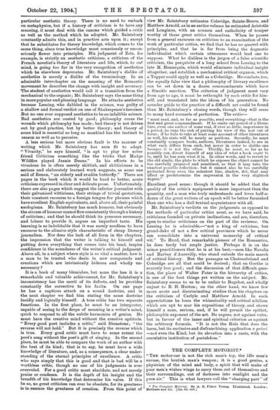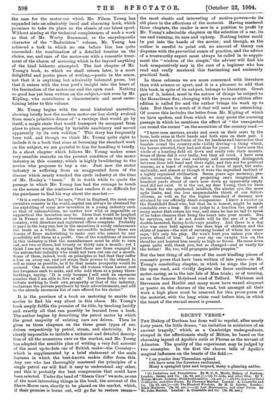"THE motor-car is not the rich man's toy, the idle
man's excuse, the brutish man's weapon ; it is a good genius, a physician of the mind and body, a spirit that will make of poor men's wishes wings to carry them out of themselves and their surroundings, out of darkness into sunlight and the pure air." This is what lawyers call the " charging part " of
• The Complete Motorist. By A. B. Filson Young. Illustrated. London Methuen and Co. [128. Bd. net.)
Without aiming at the technical completeness of such a work as that of Mr. Worby Beaumont, or the encyclopaedic character of the "Badminton" volume, Mr. Young has achieved a task in which no one before him has quite succeeded : the combination of a detailed treatise on the choice, use, and care of the motor-car with a romantic treat- ment of the charm of motoring which is far beyond anything
of the kind hitherto attempted. The last chapter of Mr. Young's book, to which we shall return later, is a most
delightful and poetic piece of writing,—poetic in the sense, not that it is anything but admirably balanced prose, but that it enters with the true poet's insight into the heart of the fascination of the motor-car and the open road. Nothing so good has yet been written on the subject,—not even by Mr. Kipling, who contributes a characteristic and most enter- taining letter to this volume.
Mr. Young begins with the usual historical narrative, showing briefly how the modern motor-car has slowly evolved from man's primitive dream of " a carriage that would go by itself, a magic chair that would transport its occupant from place to place, proceeding by invisible machinery and moved apparently by its own volition." This story has frequently
been told, and though we think Mr. Young quite right to include it in a book that aims at becoming the standard work on the subject, we are grateful to him for handling it briefly.
In a short chapter which follows Mr. Young makes some very sensible remarks on the present condition of the motor industry in this country, which is highly bewildering to the novice who proposes to buy a car. Just now the motor industry is suffering from an exaggerated form of the disease which nearly wrecked the cycle industry at the time of Mr. Hooley's " boom." It is worth while to quote the passage in which Mr: Young has had the courage to touch on the source of the confusion that renders it so difficult for the purchaser to find his way about the market
"It is a curious fact," he says, "that in England, the most con- servative country in the world, capital can always be obtained for the exploiting of some new invention in a young industry such as that of automobilism, no matter how wild or impossible or unpractical the invention may be. Ideas that would be laughed at in France or America or Germany get a solemn trial in this country, with directors and registered offices complete. Probably it pays in the long run, but in the meantime it sorely embarrasses the trade as a whole. In the automobile industry there are dozens of firms undertaking to make cars who cannot by any possibility sell them at a profit. One of the conditions of success in this industry is that the manufacturer must be able to turn out, not two or three, but twenty or thirty cars a month ; yet I think I am not wrong in saying that there are firms engaged in the automobile industry who could not turn out one car a month. Some of them, indeed, work on principles so bad that they suffer a loss on every car, and yet strain their powers to the utmost to sell as many as possible, as if by that means prosperity would be assured. One is reminded of the old woman whose loaves cost her twopence each to make, and who sold them at a penny three- farthings, saying : It is only because I sell such an enormous number that I am able to live at all: Yet these firms, who con- tribute nothing to their own prosperity or that of the industry, embarrass the private purchaser by their advertisements, and add to the already enormous list of cars offered for his choice."
It is the province of a book on motoring to enable the novice to find his way about in this chaos. Mr. Young's
book amply fulfils the promise of its title, by teaching lucidly and exactly all that can possibly be learned from a book. The author begins by describing the petrol motor by which the great majority of existing cars are driven. Then he gives us three chapters on the three great types of car, driven respectively by petrol, steam, and electricity. It is clearly impossible to include a technical and detailed descrip- tion of all the numerous cars on the market, and Mr. Young has adopted the sensible plan of writing a very full account of the most up-to-date car of British make—the Crossley— which is supplemented by a brief statement of the main features in which the best-known makes differ from this. Any one who has thoroughly mastered the principles of a single petrol ear will find it easy to understand any other, and this is probably the best compromise that could have
been selected. Under the head of "Steam Cars" we note, as one of the most interesting things in the book, the account of the Shave-Morse cars, shortly to be placed on the market, which, if their promise is borne out, will go far to restore steam—
practical book. Mr. Young's admirable chapters on the selection of a car, its use and running, its care and upkeep. Nothing better could be put into the hands of the novice ; and though, as the author is careful to point out, no amount of theory can dispense with the proverbial ounce of practice, and the advice of a trustworthy expert must always be called in to supple- ment the "wisdom of the simple," the adviser will find his task comparatively easy in the case of a beginner who has read and really mastered this fascinating and eminently In these columns we are more concerned with literature than with science or sport, and it is a pleasure to add that this book, in spite of its subject, belongs to literature. Great part of it, indeed, must in the nature of things be subject to the Heraclitean flux, changing with the years as edition after edition is called for and the author brings his work up to date. But there is much of it that will need no retouching. Of course this includes the letter from Mr. Kipling of which we have spoken, and from which we may quote the amusing passage in which he mentions the effect of " the unexpected car round the corner " on the amenities of the country road :—
"I have seen carriers, awake and erect on their seats by the hour, both reins in their bands and both eyes on their pair. I have seen the fat coachman of the fat landaus and barouches that bumble round the country-side visibly driving—a thing which, the horses attested, they had not done for years. I have seen the whole of a hunting field sit down and really ride their mounts. Some of them did it very badly, but they all tried. I have seen men walking on the road suddenly and accurately distinguish between their left hand and their right, and this not for political reasons, as a tenet of religion or as a form of sport, but auto- matically, and almost as though it were the ingrained instinct of a highly organised civilisation. Seven years ago accuracy, pre- cision, restraint, the idea of projecting one's imagination a. hundred yards ahead of one's nose down an apparently empty road did not exist. It is the car, my dear Young, that we have to thank for the quickened intellect, the alerter eye, the more agile limbs, and the less unquenchable thirst of our fellow- citizens, as well as for the higher standard of decency now attained by our officially dumb companions. I know a rooster on the Heathfield Road who, but that he is honest, might be made constable over a trap. He can judge to a fraction the speed of every motor that comes his way, and since he has no tail to speak of he takes chances that bring the heart into your mouth. But he survives, and I do not doubt will be the sire of a line of double-breasted, facing-both-ways poultry. And there is a dog who was once bold against the bare legs of children and the skirts of nurses—the sort of ravening hound of whom his owner says, It's only his play. He won't hurt you unless you show you're afraid of him.' Last year my car caught him on the shoulder and hoisted him nearly as high as Sirius. He came down again quite well, thank you, but so changed—and so vastly for the better ! He, too, will propagate polite puppies."
But the best thing of all—one of the most kindling pieces of romantic prose that have been written of late years—is Mr. Young's concluding chapter, in which he sings the joys of
the open road, and vividly depicts the fierce excitement of motor-racing, as in the late Isle of Man trials; or of touring, as on the famous Holyhead road of Telford. Whitman and
Stevenson and Hazlitt and many more have waxed eloquent or poetic on the charms of the road, but amongst all their work a high place must be reserved for this prose-poem of the motorist, with the long white road before him, in which the heart of the eternal secret is present.
RECENT VERSE.*











































 Previous page
Previous page